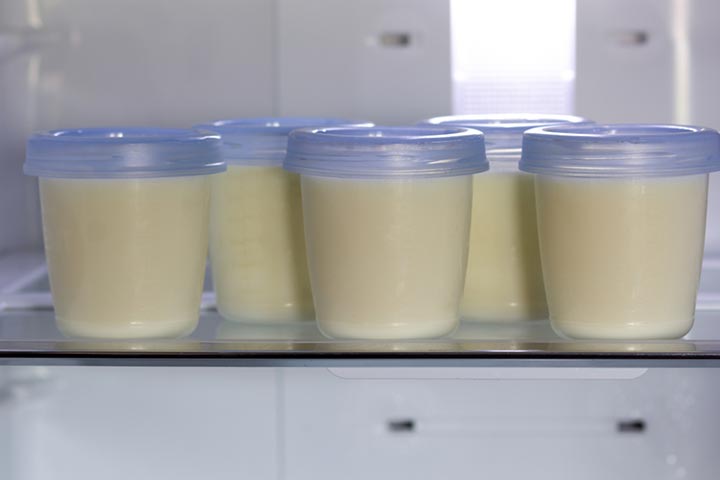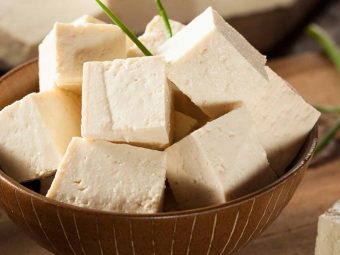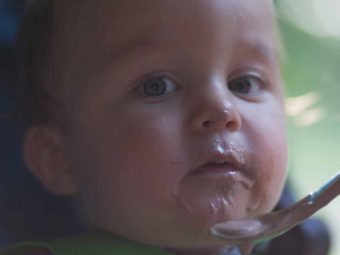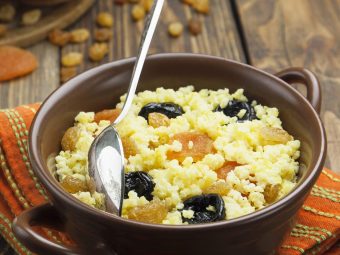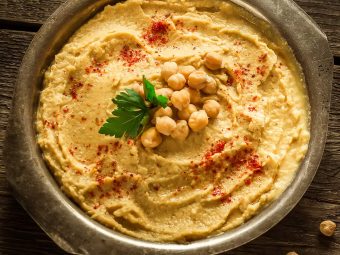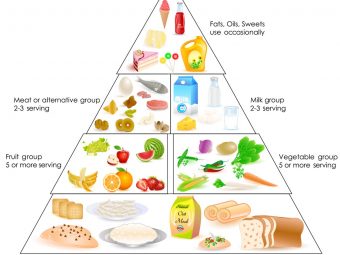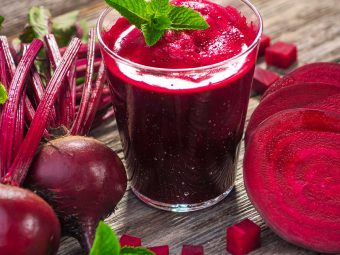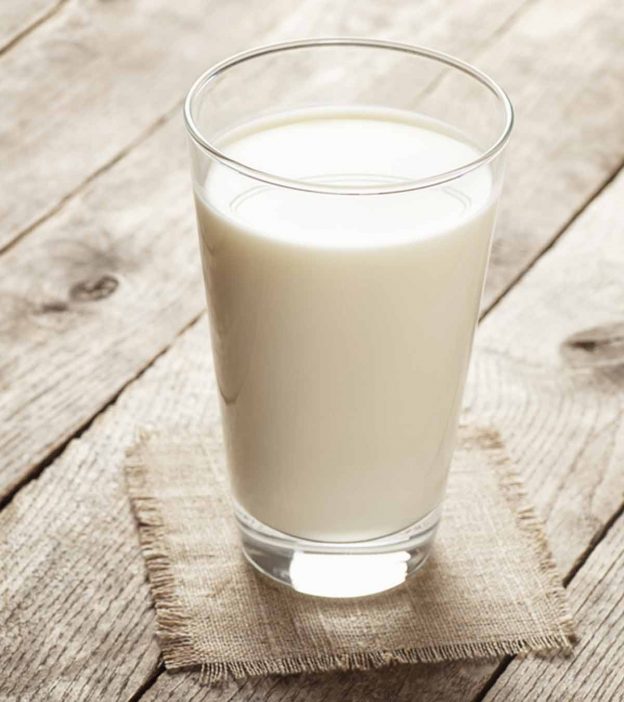
Image: ShutterStock
While it is a well-established fact that breast milk is the best form of nutrition for infants, have you ever wondered what does breast milk tastes like? Many women often ponder the question to determine if their baby is getting healthy breast milk. It is also believed that changes in breast milk’s taste may affect the breastfeeding baby’s appetite.
This post carries answers to your questions regarding breast milk’s taste, factors affecting it, and whether it is okay for you and your partner to taste breast milk.
What Does Breast Milk Taste Like?
Image: Shutterstock
If you are wondering about breast milk’s characteristics, it is creamy and tastes sweet. It is a lot similar to cow’s milk.This interpretation, however, varies from person-to-person. Some people find breast milk’s flavors to be heavily sweetened, almost like honey orsugar water, while others recall it being sweet-salty.
Whatever the perceived taste, the vital point to note is that breast milk does have a peculiar taste. But if that’s the case, you may wonder how does breast milk gets its taste? Let us proceed to the next section to find out breast milk’s composition.
 Research finds
Research findsWhat Gives Breast Milk Its Taste?
Image: Shutterstock
Human milk’s flavor relies on its nutritional composition, greatly influenced by what you eat during the lactation period.Evidence suggests that a mother eating a well-balanced diet containing foods from different food groups exposes her young one to varying flavors from a young age.It could impact your baby’s food choices later in life since they would be more likely to accept foods with a familiar taste(1)(2).
Factors That Affect Breast Milk Taste
Below are some of the significant factors that could affect the flavor of breast milk.
- Food:A baby may get their first taste of food flavors in the mother’s womb since the mother’s diet could affect the taste of the amniotic fluid(3). Babies get reintroduced to these tastes during breastfeeding when the mother eats the same food and drinks. In the beginning, the baby might not respond to these flavors amicably. But gradually, they develop a tolerance to it.Nevertheless, they may dislike a sudden change in breast milk’s flavor due to certain foods in the maternal diet.Experts note that strongly flavored foods, such as garlic and chili, may change the breast milk’s taste and smell(4)(5).
 Did you know?
Did you know?- Hormones:Hormonal changes postpartum are as obvious as they are during pregnancy. They can occur when your menstrual cycle returns. Hormonal changes could alter breast milk’s flavor temporarily. For instance, around ovulation, the sodium and chloride in breast milk increase, and the amount of lactose and potassium reduce, making the milk saltier(6).
- Alcohol:Consuming alcohol when breastfeeding exposes your baby to health risks as the alcohol passes to the baby through breast milk. Besides, it alters breast milk’s flavor and might cause sensitive babies to stop feeding temporarily(7).
Image: Shutterstock
- Smoking:Research shows that smoking when breastfeeding could affect breast milk’s taste(8).The alteration in the taste might affect sensitive babies, impacting their breast milk intake.Experts recommend quitting smoking during the lactation period.
- Medications:Several medicines might affect breast milk’s taste and smell, affecting thebaby’s milk intake. Discuss with your doctor in detail the effects of any medication on your breast milk’s taste and baby’s health in general.
- Breast infection:Breastfeeding mothers often face breastfeeding problems, such as breast inflammation due to mastitis, which is a breast infection. Research notes that breast inflammation due to infections tends to make the breast milk salty(9).
- Breast milk storage:Expressed breast milk stored appropriately is safe for consumption. However, incorrectly stored breast milk could taste metallic or fishy(10). These changes indicate the milk has gone rancid and is unfit for consumption. Breast milk’s taste could also change when frozen. However, it is a normal changedue to lipase, an enzyme in breast milk that breaks down the milk fat into fatty acids.
 Quick tip
Quick tipImage: Shutterstock
Can Adults Consume Breast Milk?
An adult may try their or their partner’sexpressed breast milk. You must avoid trying or letting your partner try breast milk if you can transmit any infection through it. Some people wish to try someone else’s breast milk, but doing so can be potentially dangerous since it could cause the transmission of dangerous pathogens, including HIV and hepatitis viruses.
常见问题ns
1. How does breast milk smell?
Similar to taste, the smell of your breast milk may also depend on your diet or the presence of excess lipase and give out a sour, soapy, or fishy odor(10).
2. Does breast milk get sour in the breast?
Breast milk may taste sour due to increased chemical oxidation or lipase activity in the body. But it does not imply that the milk has gotten bad inside the breast. Despite the taste or the smell, milk, drunk straight from the breast, is completely safe for the baby(10)(11).
3. What if the baby drinks bad breast milk?
If you accidentally give your baby stale stored breast milk, they may vomit it. However, you must consult your doctor if you see more severe reactions such as fever or diarrhea.
母乳的味道是一种常见的追求什么ion that might occur to many? However, it should be noted that the interpretation of the taste varies from one person to another. Several factors can affect the taste of breastmilk and alter its composition, such as food, health, hormones, or any form of sickness. Therefore, it is advised that nursing mothers should have nutritious food and take proper care of themselves to ensure that their baby is getting the right amount of nutrients.
Infographic: Misconceptions About Breast Milk Taste
If you are a nursing mom, you would have heard many things and suggestions to retain your breast milk’s good taste and consistency. The infographic below explains some common misconceptions and facts surrounding breast milk taste.

Illustration: Momjunction Design Team
Get high-quality PDF version by clicking below.
Download Infographic
Key Pointers
- Human milk tastes similar to cow’s milk, but interpretation may vary from person to person.
- Breastmilk’s taste primarily relies on its nutritional composition, which depends on the maternal diet.
- Postpartum hormonal changes, medications, breast infection, and breast milk storage are the additional factors that could affect breastmilk’s taste.
You may wonder what breast milk tastes like. Watch this informative video to understand how human milk tastes and how it differs from other types of milk.
References:
2. Joanne M Spahn et al.;Influence of maternal diet on flavor transfer to amniotic fluid and breast milk and children’s responses: a systematic review;牛津大学出版社
3. Julie A. Mennella et al.;Prenatal and Postnatal Flavor Learning by Human Infants;NCBI
4.Breastfeeding and a Mother’s Diet: Myths and Facts;La Leche League GB
5. Goun Jeong et al.;Maternal food restrictions during breastfeeding;NCBI
6. P E Hartmann and C G Prosser;Acute changes in the composition of milk during the ovulatory menstrual cycle in lactating women;The Physiological Society
7. J A Mennella;Infants’ suckling responses to the flavor of alcohol in mothers’ milk;NCBI
8. Julie A. Mennella et al.;Breastfeeding and Smoking: Short-term Effects on Infant Feeding and Sleep;NCBI
9. Michiko Yoshida et al.;Taste of Milk from Inflamed Breasts of Breastfeeding Mothers with Mastitis Evaluated Using a Taste Sensor;NCBI
10.Milk Issues;La Leche League International
11.Myths and facts about breastfeeding;State of New Jersey Department of Health
12.Marine Oils;National Library of Medicine






